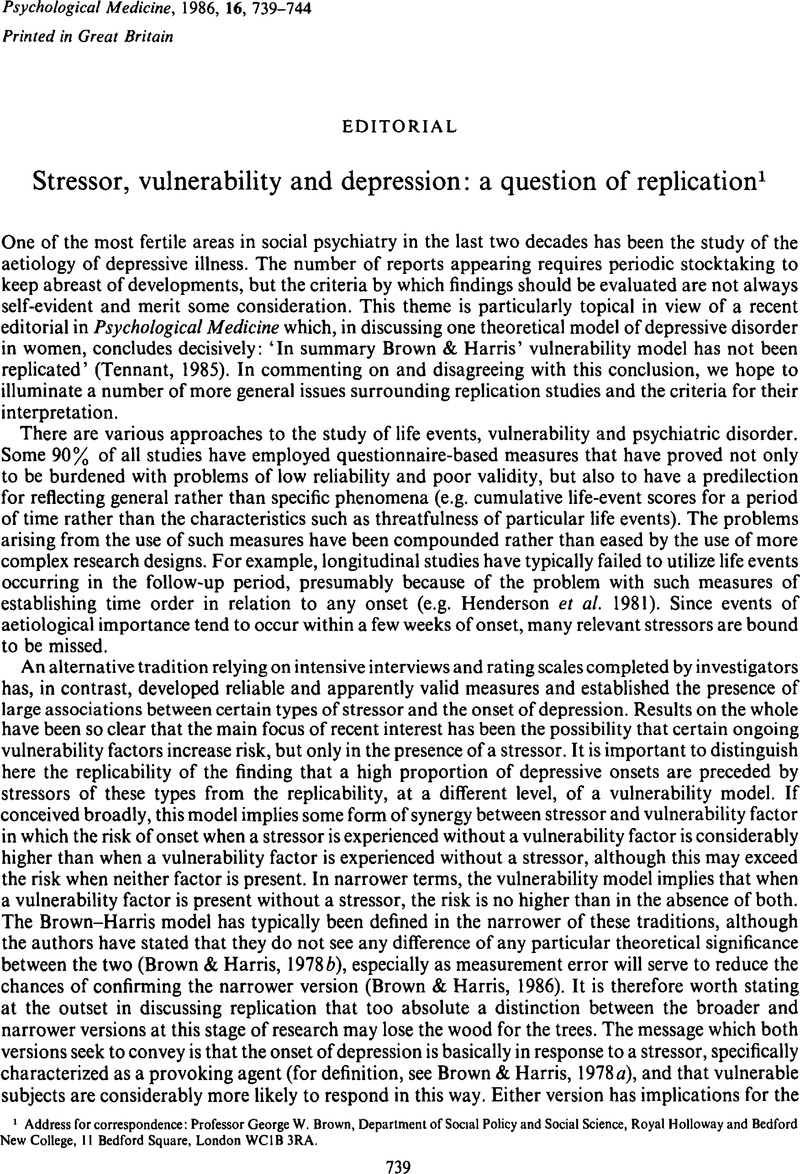Crossref Citations
This article has been cited by the following publications. This list is generated based on data provided by Crossref.
Harris, Tirril
Brown, George W.
and
Bifulco, Antonia
1987.
Loss of parent in childhood and adult psychiatric disorder: the role of social class position and premarital pregnancy.
Psychological Medicine,
Vol. 17,
Issue. 1,
p.
163.
Zimmermann‐Tansella, C.
Donini, S.
Ciommei, A. M.
and
Siciliani, O.
1988.
Social factors associated with the use of psychotropic drugs: Alcohol abuse and minor psychiatric morbidity in the community.
Acta Psychiatrica Scandinavica,
Vol. 77,
Issue. 1,
p.
14.
O'Connell, Ralph A.
and
Mayo, Julia A.
1988.
The Role of Social Factors in Affective Disorders: A Review.
Psychiatric Services,
Vol. 39,
Issue. 8,
p.
842.
Eales, M. J.
1988.
Depression and anxiety in unemployed men.
Psychological Medicine,
Vol. 18,
Issue. 4,
p.
935.
Graham, Neil M. H.
1988.
PSYCHOLOGICAL STRESS AS A PUBLIC HEALTH PROBLEM: HOW MUCH DO WE KNOW?.
Community Health Studies,
Vol. 12,
Issue. 2,
p.
151.
Cheng, Tai Ann
1989.
Psychosocial stress and minor psychiatric morbidity: a community study in Taiwan.
Journal of Affective Disorders,
Vol. 17,
Issue. 2,
p.
137.
Cheng, T. A.
1989.
Sex difference in prevalence of minor psychiatric morbidity: a social epidemiological study in Taiwan.
Acta Psychiatrica Scandinavica,
Vol. 80,
Issue. 4,
p.
395.
Cheng, T. A.
1989.
Urbanisation and minor psychiatric morbidity.
Social Psychiatry and Psychiatric Epidemiology,
Vol. 24,
Issue. 6,
p.
309.
Deadman, J. M.
Dewey, M. J.
Owens, R. G.
Leinster, S. J.
and
Slade, P. D.
1989.
Threat and loss in breast cancer.
Psychological Medicine,
Vol. 19,
Issue. 3,
p.
677.
Martin, Claudia J.
Brown, George W.
Goldberg, David P.
and
Brockington, Ian F.
1989.
Psycho-social stress and puerperal depression.
Journal of Affective Disorders,
Vol. 16,
Issue. 2-3,
p.
283.
Surtees, P. G.
1989.
Hosts to adversity.
Acta Psychiatrica Scandinavica,
Vol. 80,
Issue. 3,
p.
236.
Craig, T. K. J.
and
Murphy, Elaine
1989.
The Camberwell Collaborative Depression Study.
British Journal of Psychiatry,
Vol. 154,
Issue. 4,
p.
564.
Harris, Tirril
Brown, George W.
and
Bifulco, Antonia
1990.
Loss of parent in childhood and adult psychiatric disorder: A tentative overall model.
Development and Psychopathology,
Vol. 2,
Issue. 3,
p.
311.
Oei, T. I.
and
Zwart, F. M.
1990.
The role and development of some methodological questions in life event, social support and depression research.
Stress Medicine,
Vol. 6,
Issue. 2,
p.
127.
Hickie, Ian
Wilhelm, Kay
Parker, Gordon
Boyce, Philip
Hadzi-Pavlovic, Dusan
Brodaty, Henry
and
Mitchell, Philip
1990.
Perceived dysfunctional intimate relationships: a specific association with the non-melancholic depressive subtype.
Journal of Affective Disorders,
Vol. 19,
Issue. 2,
p.
99.
Goodyer, Ian
Wright, Caroline
and
Altham, Patricia
1990.
The Friendships and Recent Life Events of Anxious and Depressed School-Age Children.
British Journal of Psychiatry,
Vol. 156,
Issue. 5,
p.
689.
Goodyer, I. M.
1990.
Annotation: Recent Life Events and Psychiatric Disorder in School Age Children.
Journal of Child Psychology and Psychiatry,
Vol. 31,
Issue. 6,
p.
839.
Harris, Tirril O.
Brown, George W.
and
Bifulco, Antonia T.
1990.
Depression and situational helplessness/mastery in a sample selected to study childhood parental loss.
Journal of Affective Disorders,
Vol. 20,
Issue. 1,
p.
27.
O'Connor, Pat
1991.
Women's Confidants Outside Marriage: Shared or Competing Sources of Intimacy?.
Sociology,
Vol. 25,
Issue. 2,
p.
241.
Elliott, B. Jane
and
Huppert, Felicia A.
1991.
In sickness and in health: associations between physical and mental well-being, employment and parental status in a British nationwide sample of married women.
Psychological Medicine,
Vol. 21,
Issue. 2,
p.
515.



